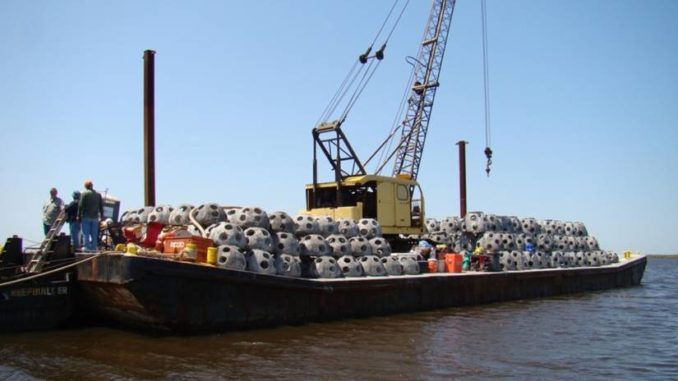
The Louisiana House of Representatives has passed legislation that would authorize the gutting of the Artificial Reef Program, but members of the Louisiana Wildlife and Fisheries Commission questioned today (June 2) the legality of such a raid because the program’s money is part of a constitutionally protected fund.
“I think that the oil companies dedicated those funds to the enhancement of fishing, and what’s happening is the state is using dedicated funds to plug the budget,” commissioner Patrick Morrow said shortly after the panel’s regular monthly meeting.
Gov. Bobby Jindal has pushed the raiding of a number of state dedicated funds, including the Artificial Reef Program, as a way of plugging a $1.6 billion budget shortfall. The Artificial Reef Program would lose almost $27 million under the current plan, leaving $5 million in the fund. Eighteen million dollars was yanked from the fund last year.
House Bill 477 calls for $26,613,236 to be moved from the Artificial Reef Development Fund to the state General Fund. The bill is now awaiting debate in the Senate.
Commission President Stephen Sagrera sent Jindal, House of Representatives Speaker Jim Tucker and Senate President Joel Chaisson Jr. a letter last month strongly objecting to the raid.
“The Commission views the proposed appropriation of this money to non-fish and wildlife purposes to be contrary to law and the Constitution, as well as a breach of faith both to the oil companies who made the donations and the (LDWF’s) user groups,” the letter reads. “The appropriation of these moneis to the Overcollections Fund is in vioation of both the letter and spirit of the law.”
LDWF Undersecretary for Fisheries Randy Pausina and ARP Manager Doug Peter explained during the Commission meeting that the money Jindal and legislators want to remove from the program comes from a $25 million base that was decided upon when the program was set up in 2005, with expenditures coming from interest.
Morrow pointed out that language in the donation agreements makes it clear that the money should be untouchable without a vote of the people.
“… (D)oesn’t the standard donation clause when an oil company donates money … say that donations to the Artificial Reef Fund (that) ‘donor agrees to and shall donate to the Conservation Fund,?” he said, reading from a deed of donation. “So those monies should be in the Conservation Fund and, if they’re in the Conservation Fund, they’re constitutionally protected and an act of the Legislature cannot override a constitutional provision.
“You’ve got to go through the people.”
The Conservation Fund is the main source of LDWF money.
Commissioner Ronny Graham later backed up Morrow’s contention that the ARP money shouldn’t even be on the chopping block.
“We have a democratic form of government, and if it’s in the constitution then we ought to be abiding by the constitution,” Graham said.
LDWF attorney Don Puckett confirmed that ARP money is donated to the Conservation Fund, but refused to comment on whether or not that makes legislative use of that money illegal.
Commissioner Mike Voisin told Pausina that, despite the best intentions of setting up a $25 million base for the ARP, it might be best to reconfigure the program to make use of all money as soon as possible.
“It just seems to me the challenge is this $25 million,” Voisin said. “Not that (accumulating the financial base is) not the right thing to do … but it creates this challenge that we’re faced with at this point.”
Graham agreed.
“I think the original plan (of maintaining a $25 million base) was a good plan, but if we’re going to have a governor every two or three years trying to get their meat hooks on it,” Graham said. “Spend the money, get your programs going and do what you can, and they’re not going to come get $1 million, but they’ll come get $25 million.”
“I think it might behoove you to come up with a different budget ….”
Pausina indicated he would take the suggestion to the panel that manages the fund.
“Sounds like a good recommendation …,” he said.
David Cresson of the Coastal Conservation Association Louisiana agreed after the meeting that the way the fund is managed should be rethought.
“The problem is that money is sitting there,” Cresson said. “They need to spend (it).”
And he said that it’s the Commission’s job to ensure LDWF officials put the money to use instead of allowing raids.
“That’s where the commission needs to step up and ask every week, ‘What’s budgeted to spent, and what’s it being spent on?’” Cresson said.
Cresson said his group has been working with Jindal to try and remove the Artificial Reef Program money from the proposed legislation (House Bill 477) that has now moved to the Senate for debate.
“We don’t like it,” Cresson said. “It’s no secret that we have a close relationship with Gov. Jindal, and we’ve met with him a lot behind closed doors basically begging him not to take the money.
“He’s said he basically has not options.”
However, he declined to say whether or not he believed taking money from the ARP fund is illegal based on the fact that it is part of the constitutionally protected Conservation Fund.
“That’s a good argument; I’ve never thought about it that way,” Cresson said. “I’d have to get our attorney to look at it.”
EDITOR’S NOTE: Lousiana Sportsman encourages our users to contact your senator to object to the raid on this fund.


